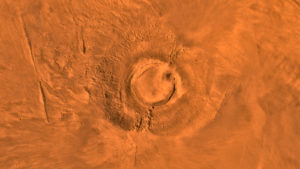 Recently discovered evidence suggests that Mars once had a massive lake larger than any that we have Earth, which may bode well for the theory that our neighboring planet used to also have life.
Recently discovered evidence suggests that Mars once had a massive lake larger than any that we have Earth, which may bode well for the theory that our neighboring planet used to also have life.
The observations were made by the Mars Reconnaissance Orbiter, a NASA spacecraft that is currently circling above the red planet’s surface. It discovered the ancient lake bed in the Eridania basin, an area in the planet’s southeast, when it detected massive mineral deposits buried beneath the ground. Scientists believe that the minerals were built up by underwater vents that existed back when the planet was geologically active, and remain now that both the water and volcanoes are gone.
The area is large enough that scientists estimate that it could have held ten times as much water as all five of the North American Great Lakes, which by themselves contain more than 20 percent of all the freshwater on planet Earth.
“This site gives us a compelling story for a deep, long-lived sea and a deep-sea hydro-thermal environment,” says Paul Niles of NASA. “It is evocative of the deep-sea hydro-thermal environments on Earth, similar to environments where life might be found on other worlds—life that doesn’t need a nice atmosphere or temperate surface, but just rocks, heat and water.”
In other words, if we were going to find evidence that Mars once had life, this is where we should start looking, because the combination of water and geothermal energy mimics the prehistoric Earth quite well. This could provide us with a variety of clues about what the very first life was like on our own planet, or at least give us a glimpse of what the environment would have been like when that life first began to develop—a more pristine view, perhaps, than we can find on our constantly changing planet.
“Even if we never find evidence that there’s been life on Mars, this site can tell us about the type of environment where life may have begun on Earth,” says Niles. “Volcanic activity combined with standing water provided conditions that were likely similar to conditions that existed on Earth at about the same time—when early life was evolving here.”
This new lake isn’t the only massive feature known to exist on Mars: it also has Olympus Mons, the largest mountain known in the solar system, more than twice as tall as Mount Everest.





